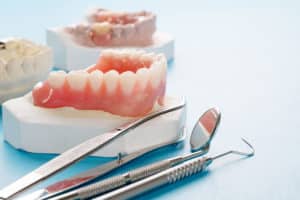What Dentures Can Do for Your Smile


Your smile is one of the first things that people see! However, many people suffer from missing, broken, or stained teeth, which affects their appearance. To combat this issue, dentures are becoming more and more popular among those who seek to improve the look and functionality of their smiles. Depending on your needs and wants, you could be eligible for either partial or complete dentures, both of which make it easier to eat, chew, and speak. Read on to find out the differences between the different types of dentures and what they can do for your smile!
How Do You Lose Teeth?
Did you know that you don’t actually have to lose your teeth with age? This is not something that will happen to everyone, especially if they have great oral hygiene habits. The American Dental Association recommends that every person brush their teeth at least twice a day, for 2 minutes at a time. Brush after every meal with quality fluoride toothpaste to avoid oral health diseases even more. The ADA also recommends flossing 1-2 times a day as well as visiting your dentist biannually. But, why?
When you eat or drink anything, you leave your mouth susceptible to decay. That means, that every single meal of every single day has an effect on your teeth. When you eat, saliva and bacteria break down food for digestion. However, some mouth bacteria will mix with sugars in your foods and drinks to create a clear, sticky substance called plaque.
Plaque is very acidic in nature, and it doesn’t get washed down, but instead sticks to your tooth enamel, especially along the gum line. As it sits on your teeth after a meal, the acids work to break up minerals in the teeth, creating cracks for bacteria to get inside your tooth. Dead areas from decayed minerals will create what we call cavities in your tooth enamel. Bacteria that has gotten inside the teeth will eventually lead to inner tooth decay and infection. Plaque is clear, so it’s hard to see, which is why brushing and flossing must happen often. When you start to feel tooth pain, you may already have an inner tooth infection that could lead to losing a tooth.

A Look at Some Statistics
Essentially, sugar is the biggest culprit of losing your teeth. That’s why oral hygiene is so essential to combatting plaque that leads to tooth decay. Over time, if you don’t brush, floss, and visit the dentist like you should, you could lose an entire tooth to decay. The sad part is, once one tooth is lost, it makes the gums around it weaker, which could mean the surrounding teeth fall out as well, even if they aren’t decayed as much.
The amount of missing teeth in America is actually surprising considering how much access there is to dental professionals and dental products:
- About 92% or more of people have had their teeth decay by the time they reach adulthood.
- Skipping brushing and flossing leads to decayed teeth and gum disease, with the latter affecting more than 64.7 million American adults.
- When gum disease (inflammation of gums due to bacteria and plaque) gets severe, it leads to tooth loss. At least 120 million Americans are missing at least 1 tooth.
- 3.75% of American adults are missing all their teeth. Total tooth loss is referred to as “edentulism”.
- That percentage equals 36 million Americans without teeth.
- The estimated future tooth loss count is 200 million for the U.S., according to the American College of Prosthodontists.
Dentures to Fix Your Smile
The American College of Prosthodontists tells us that 178 million people in the United States are missing at least one tooth. 35 million are missing all of their teeth. If you are part of those figures and are missing many teeth, you may want to consider dentures. Missing even one tooth will affect your ability to talk, chew, eat, and may affect your physical appearance and risk for malnutrition.
Depending on your level of tooth loss, we can custom-design partial dentures or full dentures to restore your smile. A dental implant would be a custom-made tooth for one decayed tooth. Partial dentures are used when some of the teeth are missing, but some remain. Full dentures replace your entire set of teeth either in your upper jaw, lower jaw, or both.
If you invest in a full set of dentures, your lower dentures will rest on your gums and will be secured over those gums and the jawbone. The upper dentures are held in place by the suction created between the dentures and the roof of your mouth. With both sets of dentures, they can be made to be removable or permanent, depending on the status of your oral health. Implant-secured dentures are the most ideal for patients, as they don’t have to worry about slippage or other complications. Work with our dental team to find what option is the best for you!

Considering Dentures?
Nobody wants mushy gums or tooth loss. Luckily, you don’t have to have either! You simply have to brush and floss your teeth, eat well and see the dentist. However, you may already be at the point where tooth loss is happening. If that is the case, it’s time to schedule a dental visit to see if dental implants, bridges or dentures are right for you. We want to do all we can to stop tooth loss from happening, if it’s possible.
Dentures, if needed, can restore the integrity and strength of your smile for many years to come. Plus, it can make your smile look much more white, radiant and healthy if you have tooth decay and gum disease. To schedule your dentures consultation, or an appointment for a comprehensive exam, call Dr. Ania’s office at 303-443-0998!


